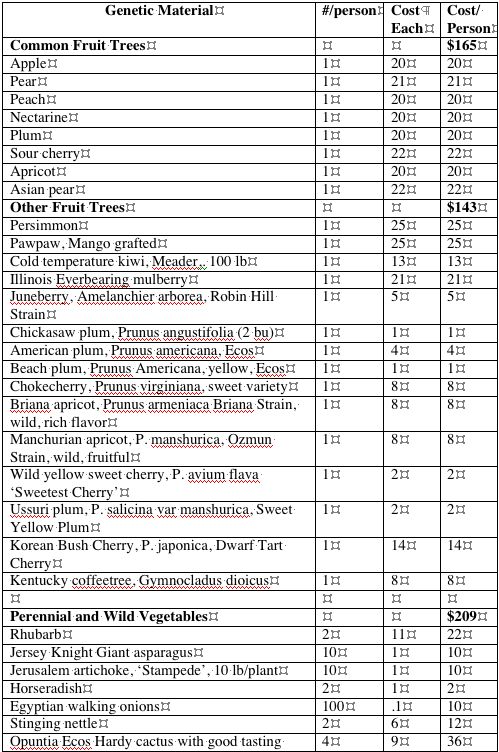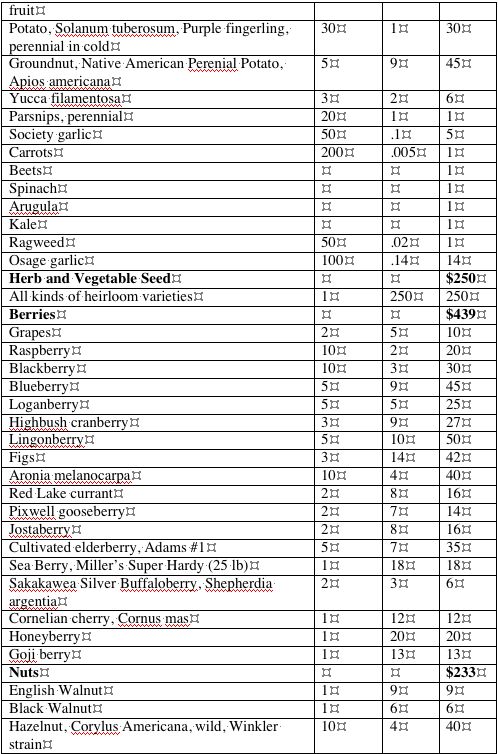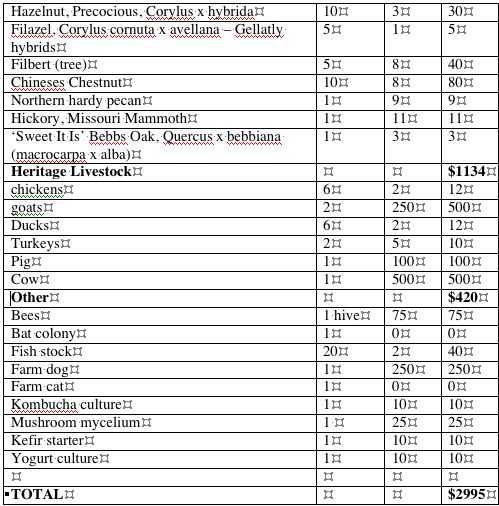Perennial Agriculture: Difference between revisions
(→Books) |
No edit summary |
||
| (14 intermediate revisions by 6 users not shown) | |||
| Line 1: | Line 1: | ||
=2023 Addendum= | |||
*With pit greenhouses fueled by solar heat or waste heat, we can do tropicals indoors, such as oranges, avocado, banana, and others. Cost is high, but in a well-designed pit greenhouse or 3D printed structure, this can be lower cost than imports in the framework of an open source movement entrepreneurhip community. | |||
=Introduction= | =Introduction= | ||
Here is a gene base for an integrated, permacultural landscape proposed for Factor e Farm. We are designing with the intent to replicate the same to future facilities - by propagation techniques. | Here is a gene base for an integrated, permacultural landscape proposed for Factor e Farm. We are designing with the intent to replicate the same to future facilities - by propagation techniques. | ||
It costs about $3k to acquire the listed genetic base per person. After the initial plantout and acquisition, the entire stock can be propagated | It costs about $3k to acquire the listed genetic base per person. After the initial plantout and acquisition, the entire stock can be propagated. A business model for a Propagation Share should be developed here, and may take an establishment time of 5 or so years to come into play. Once a number of such facilities are available, however, replication can happen faster. This is like [http://www.heifer.org/site/c.edJRKQNiFiG/b.3538797/?msource?msource=kw2485&gclid=CK_1xtvwgZgCFSJIagod-Wc-Cg Heifer Projects International] stock sharing - but not only for poor people. | ||
Together with the [[Integrated Food and Waste Management System]] - we can create a healthy food system to replace the present disaster. | Together with the [[Integrated Food and Waste Management System]] - we can create a healthy food system to replace the present disaster. | ||
| Line 13: | Line 15: | ||
[[Image:genes3.jpg]] | [[Image:genes3.jpg]] | ||
==Further Information== | |||
We are looking for stewardship members for the open source community gene bank. Read more about it [[Community_Gene_Bank|here]]. | |||
==Books== | |||
* Martin Crawford: "''Creating a Forest Garden: Working with Nature to Grow Edible Crops''" (released July 2010) | |||
* Eric Toensmeier: "''Perennial Vegetables: From Artichokes to Zuiki Taro, A Gardener's Guide to Over 100 Delicious and Easy to Grow Edibles''" | |||
* Dave Jacke "''Edible Forest Gardens''"; - Vol. 1 has theory plus Forest Gardening Top 100 species; Vol. 2 is the practice. | |||
* Wildman Bill: ''Identifying and harvesting wild edible and medicinal plants in wild(and not so wild)'' (recommended by Blake C.) | |||
*'''Solviva''' - on a year-round, integrated greenhouse - [http://www.solviva.com/visit_solviva.htm]. See [[Critique of Solviva]]. | |||
[[Category:OSA]] | [[Category:Food and Agriculture]][[Category:OSA]] | ||
Latest revision as of 18:53, 16 February 2023
2023 Addendum
- With pit greenhouses fueled by solar heat or waste heat, we can do tropicals indoors, such as oranges, avocado, banana, and others. Cost is high, but in a well-designed pit greenhouse or 3D printed structure, this can be lower cost than imports in the framework of an open source movement entrepreneurhip community.
Introduction
Here is a gene base for an integrated, permacultural landscape proposed for Factor e Farm. We are designing with the intent to replicate the same to future facilities - by propagation techniques.
It costs about $3k to acquire the listed genetic base per person. After the initial plantout and acquisition, the entire stock can be propagated. A business model for a Propagation Share should be developed here, and may take an establishment time of 5 or so years to come into play. Once a number of such facilities are available, however, replication can happen faster. This is like Heifer Projects International stock sharing - but not only for poor people.
Together with the Integrated Food and Waste Management System - we can create a healthy food system to replace the present disaster.
Further Information
We are looking for stewardship members for the open source community gene bank. Read more about it here.
Books
- Martin Crawford: "Creating a Forest Garden: Working with Nature to Grow Edible Crops" (released July 2010)
- Eric Toensmeier: "Perennial Vegetables: From Artichokes to Zuiki Taro, A Gardener's Guide to Over 100 Delicious and Easy to Grow Edibles"
- Dave Jacke "Edible Forest Gardens"; - Vol. 1 has theory plus Forest Gardening Top 100 species; Vol. 2 is the practice.
- Wildman Bill: Identifying and harvesting wild edible and medicinal plants in wild(and not so wild) (recommended by Blake C.)
- Solviva - on a year-round, integrated greenhouse - [1]. See Critique of Solviva.


